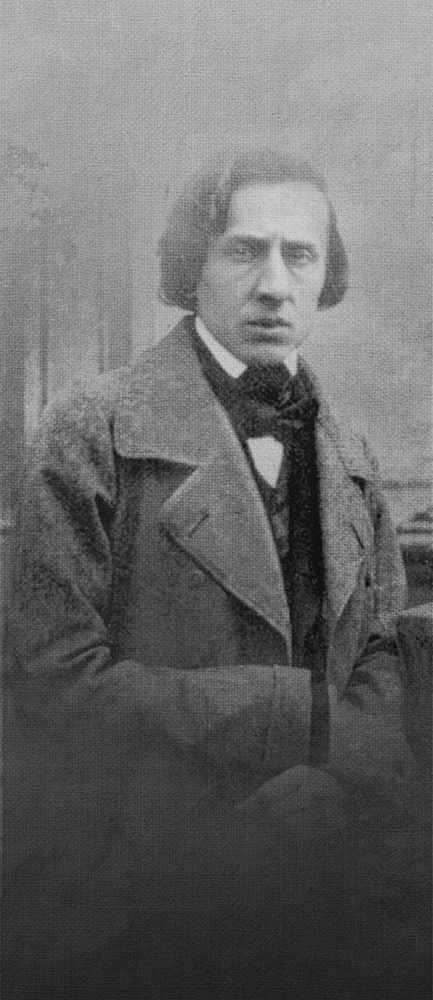
Fryderyk Chopin<
Composer and pianist (born on 22.02 or 1.03 1810 in Żelazowa Wola, Poland, died on 17.10.1849 in Paris, France)
Varsovian by birth, Pole by heart, citizen of the world by talent – a quote about Frédéric Chopin by Cyprian Kamil Norwid.
Poet of the grand piano – these words were used to describe Frédéric Chopin by many of his contemporaries. To this day Chopin is considered one of the pre-eminent creators of classical music, next to such composers as Bach, Beethoven or Mozart. Chopin is also a leading example of the Romantic era of music. At the heart of his creative output was his great sensitivity to music, inspiration by Polish folk music and incredible talent.
Frédéric was born in Żelazowa Wola, a small village in Mazovia where his father Nicholas, a Frenchman by birth, was working for a Polish aristocratic family of Skarbeks. The Chopin family moved to Warsaw the same year and found residence on Krakowskie Przedmieście street.
Chopin's mother, Justyna, was an extremely musical person. She sang and played the grand piano. She infected her son with the love for the black and white keys. As a six-year old, little Frédéric was taking lessons from Wojciech Żywny, a Czech-Polish pianist. A year later, young Frédéric composed his first Polonaise, B-flat major, the manuscript of which was written up by his father. This period of time also marked the beginning of Chopin's public concerts. He played at charity events as well as for Warsaw's aristocracy. His debut came on 24 of February 1818, when he played in Namiestnikowski Palace (today the Presidential Palace on Krakowskie Przedmieście street).
At the age of 16, Chopin began his studies in music composition at the Warsaw Conservatory under the tutelage of famous composer Józef Elsner. Development of his great talent was influenced by his exposure to folk song and dance from Mazovia, Kuyavia, Lublin and Greater Poland Voivodeships. In 1826 Chopin went on his first foreign voyage to Berlin.
In 1829 Frédéric Chopin began his independent composing career. A year later he performed for the last time in front of a live audience in Warsaw. He departed Warsaw, never to return on 2 November 1830. He arrived in Dresden, afterwards visiting among others Vienna, Salzburg, Munich and Stuttgart. During the stay in the last city, he learned about the outbreak of the November Uprising (aka the Cadet Revolution) in Poland. Moved by the fate of his compatriots, he drew up the first draft of Revolutionary Etude, one is his most famous pieces. In 1831 he permanently settled in Paris.
The second half of Chopin's life was filled with an increased concert activity in, among others, France, Germany and England. During these performances, Frédéric presented his own works, solidifying his renown as an accomplished musician. At the same time he was teaching music and maintaining friendly relations with other geniuses of classical music like Franz Liszt or Felix Mendelssohn. Year 1836 marks the beginning of his acquaintance with George Sand. This was also the time when he started suffering from tuberculosis.
Chopin's health condition worsened year by year. In 1848 the composer gave a concert tour around England and Scotland and on the 16 of November he performed his last public concert in London.
Frédéric Chopin died on 17 October 1849 in his apartment at Vendome Place 12. He was buried in a Parisian cemetery Père-Lachaise. The heart of the musician rests in the Church of Holy Cross in Warsaw on Krakowskie Przedmieście street.
Do you know?
- Although Chopin is considered a genius of Romantic music, he himself was not a fan of this genre. He considered Mozart and Bach as true geniuses of the piano.
- Chopin composed over 200 pieces, among others: 57 mazurkas, 27 etudes, 26 preludes, 19 waltzes, 19 nocturnes and 16 polonaises.
- The day of Chopin's birth is not known with certainty. In birth and baptismal record books the date of 22 February is given. Frédéric himself and his family considered 1 March as the correct date.
- The Chopins changed their residence in Warsaw several times. They lived, among other places, in a no longer existing Saxon Palace, in a tenement building located on today's campus of Warsaw University, as well as on campus of today's Academy of Fine Arts.
- Statue of Frédéric Chopin sitting underneath a weeping willow in Warsaw, is one of the landmarks of the capital. It was raised in 1926 in Łazienkowski Park and again in 1958 after rebuilding it from wartime damage. Since 1959, every Sunday from May to September, the plaza in front of the monument is host to Chopin concerts.
- There is a Chopin Route in Warsaw, which allows tourists to follow the first twenty years of the composer's life. At each station of the route there is a characteristic black bench, allowing the tourists to listen to Chopin's famous works.






